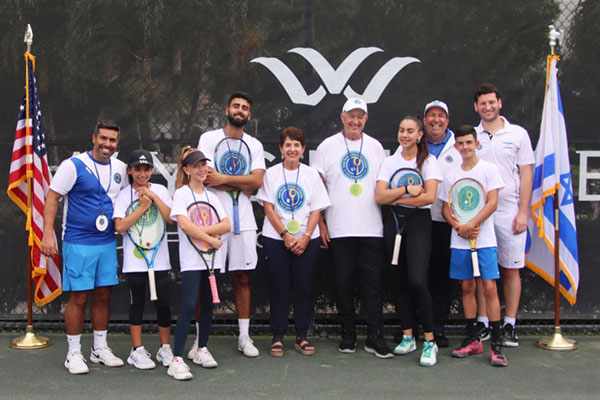
On Thursday, March 7, the residents of the Wycliffe Golf & Country Club received a first-hand report on what life is like in Israel for children. Many personal messages were delivered that day by a group of young ambassadors, with tennis racquets in hand, who are affiliated with the Israel Tennis & Education Centers (ITEC).
For many years each March, an ITEC delegation has visited Wycliffe in order to provide a first-hand report on the importance of the work of ITEC and its positive impact on the lives of Israeli children.
But because of the current conflict in Israel and Gaza, this year’s visit took on added importance and significance — for both the tennis ambassadors and the large gathering of Wycliffe residents who came to watch, listen and learn about the power and impact of the ITEC experience.
Despite the nature of life currently in Israel, ITEC’s mission continues, and the role that ITEC serves for Israeli children takes on greater importance. At each ITEC outlet, the leadership specifically caters to disadvantaged children and to children from broken homes in Israel who need a place to go after school or on weekends in order to avoid trouble on the streets.
Currently, there are 24 ITEC outlets in Israel that serve as a safe haven for Israeli children who come from many walks of life: Jews, Muslim Arabs, Christian Arabs, Bedouins, Druze, and refugees from many countries around the world, such as Nigeria, Morocco, Kenya, Ukraine and Russia. The ITEC program truly caters to a “melting pot” of children who come from very diverse cultural and religious backgrounds. The side effects of this experience for the Israeli children are life-altering — in a positive and profound way.
The services that ITEC provides range from offering a safe and secure place to do their homework to a place to spend time playing safely with friends to a place where they can enjoy a hot meal. But the focal point of the ITEC experience, which started in 1976, is learning how to co-exist in life with people from different backgrounds while learning how to play tennis.
“Since 1976, we have impacted the lives of more than 500,000 children in Israel, which is one of the most conflicted regions in the world, especially now,” said Yoni Yair, ITEC’s U.S.-based vice president of development, who is also a product of the ITEC experience back in the late 1970s. “We serve 20,000 kids annually. We serve children from all walks of life in Israel.”
At ITEC, tennis is a means to an end.
“We like to promote racquets over rockets,” Yair said.
Under the leadership of Yair, the group of young representatives who visited Wycliffe on March 7 told their personal testimonies and life stories.
“Because of ITEC, I have lots of friends, and I have learned how to play and enjoy the game of tennis,” said Aline Masri, 10, an Israeli-Muslim from Jaffa.
“At ITEC, I am friends with children who are Jewish and Muslim Arabs,” added Areina Datlenko, 11, a Christian who emigrated with her family to Israel from Ukraine in 2023. “I also learned how to hit a two-handed backhand. I love my two-handed backhand.”
“Because of ITEC, I have learned to always work hard, be positive, give back to others and to enjoy my great relationships with children from different backgrounds, whether they are Jews, Muslims or Christians,” said Inbar Pony, 18, who lives near Tel Aviv and is currently an Israeli soldier. “I have been attending ITEC for 10 years.”
After their personal testimonies, all the ambassadors headed to Wycliffe’s center court to showcase their vast and eye-opening tennis talents.
Whether it was hitting cross-court forehands, striking two-handed backhands, delivering well-struck volleys, smashing an overhead or serving an ace, these ITEC representatives demonstrated their ability to hit every shot in tennis with precision, power and panache. The crowd was thoroughly entertained and impressed.
For the group of male and female ITEC ambassadors who appeared at Wycliffe that day, each agreed that without the ITEC experience, their lives would not be where they are today — enriched by lifelong friendships with other children of different backgrounds and better off because they have learned how to play the great game of tennis.
For more information about ITEC, visit www.itecenters.org.







